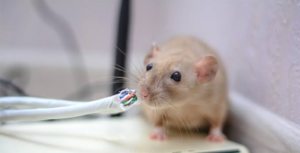Rodent-to-Human Disease Transmission
Rodents are one of the most common harmful pests that can be found in both urban and rural areas. They are most commonly seen in residential and commercial spaces, affecting property and health. Rodents are commonly detected to affect electrical wiring.
Despite being viewed as little more than pests, these animals act as reservoirs for several infections. The transmission of these infections to humans can give rise to severe illnesses. Therefore, to prevent serious infections, it is necessary to understand the mechanisms by which diseases are transmitted from rats to humans.

How diseases are transmitted through rodents?
Direct contact is one of the main ways in which diseases are spread from rats to humans. For example, mice and rats can carry parasites, bacteria or viruses in their bodies, fur or even in their feces. Humans are exposed to these pathogens through direct contact with rodents or infected surfaces. For example, hantavirus is one of the viral infections transmitted through rodents.
These vectors feed on the blood of rodents who serve as hosts before getting infected with pathogens. Consequently, when these vectors bite humans again after getting infected, they transfer the pathogens as well. It results in several diseases. For example, Lyme disease (transmitted by ticks carried by rodents), Salmonella, and West Nile virus (transmitted by mosquitoes).
Consequences of Rodents Infestations
Moreover, there is an increasing threat of disease transmission due to the increasing human population, environmental variations, and urbanization. Ecosystem disruptions, deforestation, agricultural extension, and climate change, for instance can force rodents into closer proximity with people. Additionally, globalization and international tourism have also promoted the release and distribution of rodent diseases worldwide. These infected animals or parasites may be transported through cargo ships, planes, or vehicles, which may lead to the introduction of pathogens into new area. From this perspective, it is clear that there are strong international ties regarding the aspect of disease spread; thus, proper cooperation between countries needs extensive surveillance and preventive measures. There could be outbreaks like plague, leptospirosis, and rat-bite fever, which usually cause very severe illnesses, causing an increased rate of deaths, especially where these populations have little access to healthcare facilities. The economic implications may arise from the costs of medical care associated with such diseases as well as a loss in productivity accompanied by destructions in agriculture and infrastructure, respectively, which emerges due to rodent-transmitted diseases.
In conclusion, rodents are the pathogenic organisms affecting health severely. Hence, it is important to overcome rodents’ buildup in the surrounding to prevent rodent-borne diseases. Regarding this, Aim Premium Pest Control Services, Sharjah and Ajman offer reliable pest control strategies to remove all kind of pests from your houses and commercial places effectively. Contact us now to help you get rid of rodents or any other pests from your residences and workplaces.
